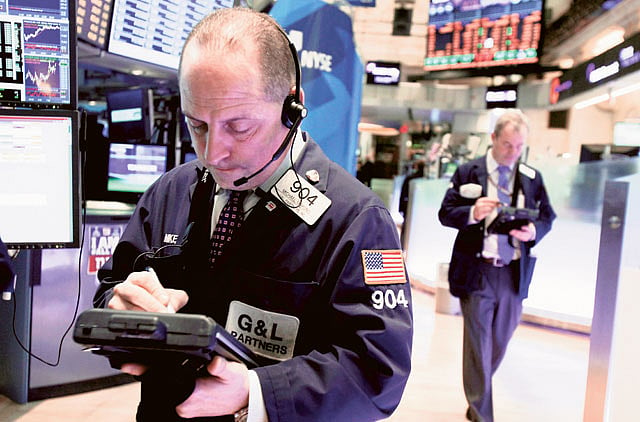Worldly Wise: Wall Street admits bonus culture's ills
Wall Street admits bonus culture's ills

Imagine if you could hear directly, albeit anonymously, from the normally secretive bankers and traders who manufactured and sold the trillions of dollars in toxic debt securities that pushed the world's financial system to the brink of disaster in 2008.
Would they defend themselves and their actions, or show a degree of remorse for what they caused and have not been held accountable for?
Well, you can find the answer to that question in Conversations With Wall Street, a compact — and largely overlooked — book by Peter Ressler and Monika Mitchell published last year..
Ressler and Mitchell worked together at a Wall Street executive search firm that specialised in finding senior people for fixed-income trading departments. They placed in their positions of leadership many of the bankers and traders who ended up causing the financial crisis that we are still trying to recover from.
"In the beginning of the crisis, we were as horrified as anyone else," Mitchell wrote in the book's preface. "Just like the general public, we along with many others in the finance world, were outraged and furious at colleagues who had damaged, if not destroyed, our livelihoods."
Stripped of glamour
The pair set about interviewing some of the people they had recruited and placed in positions of power to "bring a deeper understanding" of how Wall Street works "stripped of its glamour."
It ain't pretty. For instance, there is "Stan," one of "those guys Main Street loves to hate," whose job was to trade mortgage-backed securities. He did that for 10 years until his firm imploded. He got paid more than $1 million (Dh3.67 million) a year.
"The whole game was about price appreciation," he explained. "We weren't concerned about the value of the housing markets, just the products offered. We are in the moving business. We buy loans and securities and move them within two months."
He continued: "We sold them to money managers, pension funds, insurance companies and hedge funds. This was a seller's market. We got paid fifty cents for each hundred dollars sold. If we sold $1 billion, we made $5 million. We didn't care."
Another interviewee, "Sean," was the co-head of the fixed-income division of a major Wall Street firm, where he was on the management and executive committees. In his late 40s, his net worth was more than $100 million. He said he saw some risks coming in the mortgage market, but he could not persuade his colleagues to slow down.
"There are a lot of people on and off Wall Street who are responsible for this crisis," he explained.
"One of the main reasons it happened is because the Street got velocitised."
Then there was "Greg," a senior executive of a Wall Street group that manufactured and sold billions of dollars of mortgage-backed securities crammed full of mortgages made to subprime borrowers. Ressler spoke with him in early 2008 as the crisis was reaching a peak.
Greg's boss had been fired, and he was left alone to manage the portfolio.
He said he had known for "a few years now" that his group was creating and selling toxic securities. He said he "thought about" sharing with his bosses how concerned he was becoming. "But at the end of the year they were thrilled that we did a billion dollars" a month in securitisations tied to subprime mortgages.
"After they paid my bonus, they asked if I could double that and get the number up to $2 billion. That was what the competition was doing."
What is painfully clear from Ressler and Mitchell's transcripts is that the incentive system on Wall Street that rewards bankers and traders for the revenue they generate by constantly selling whatever comes across their desks, regardless of its quality, is terribly broken.
People are simple: They do what they are rewarded to do, and they will continue to do that over and over again until they are rewarded to do something else.
Now, four years after the crisis started — and despite the Dodd-Frank law intended to reduce the risks on Wall Street — not one thing has changed in what bankers and traders are rewarded to do. Until that happens, you can forget about preventing another crisis on Wall Street.
— Bloomberg
William D. Cohan, a former investment banker and the author of Money and Power: How Goldman Sachs Came to Rule the World.
Sign up for the Daily Briefing
Get the latest news and updates straight to your inbox
Network Links
GN StoreDownload our app
© Al Nisr Publishing LLC 2026. All rights reserved.